- Home
- Lissa Evans
Horten's Incredible Illusions
Horten's Incredible Illusions Read online
HORTEN’S
INCREDIBLE ILLUSIONS
MAGIC, MYSTERY &
ANOTHER VERY STRANGE ADVENTURE
BY LISSA EVANS
STERLING CHILDREN’S BOOKS and the distinctive Sterling Children’s Books logo are trademarks of Sterling Publishing Co., Inc.
© 2012 by Lissa Evans
All rights reserved. No part of this publication may be reproduced, stored in a retrieval system, or transmitted, in any form or by any means, electronic, mechanical, photocopying, recording, or otherwise, without prior written permission from the publisher.
ISBN 978-1-4027-9871-9
Published in 2012 in Great Britain as Big Change for Stuart.
For information about custom editions, special sales, and premium and corporate purchases, please contact Sterling Special Sales at 800-805-5489 or [email protected].
2 4 6 8 10 9 7 5 3 1
www.sterlingpublishing.com/kids
For my mum
Who read like the wind and loved books
And who was always the first to read mine.
CONTENTS
CHAPTER 1
CHAPTER 2
CHAPTER 3
CHAPTER 4
CHAPTER 5
CHAPTER 6
CHAPTER 7
CHAPTER 8
CHAPTER 9
CHAPTER 10
CHAPTER 11
CHAPTER 12
CHAPTER 13
CHAPTER 14
CHAPTER 15
CHAPTER 16
CHAPTER 17
CHAPTER 18
CHAPTER 19
CHAPTER 20
CHAPTER 21
CHAPTER 22
CHAPTER 23
CHAPTER 24
CHAPTER 25
CHAPTER 26
CHAPTER 27
CHAPTER 28
CHAPTER 29
CHAPTER 30
CHAPTER 31
CHAPTER 32
CHAPTER 33
CHAPTER 34
CHAPTER 35
CHAPTER 36
CHAPTER 37
CHAPTER 38
CHAPTER 39
CHAPTER 40
CHAPTER 41
EPILOGUE
CHAPTER 1
Stuart Horten sat at the kitchen table and looked at the front page of the crummy little newspaper he’d just been given. Then, with a feeling of foreboding, he began to read.
BEECH ROAD GUARDIAN EXCLUSIVE!!!
Beech Road resident Stuart Horten, (aged 10, but looks younger) discovers his lost great-uncle’s hidden magician’s workshop under the bandstand in Beeton Park!!
Stuart Horten (10, but looks younger) moved to Beeton at the start of the summer vacation, less than a month ago, but already claims to have made a huge discovery. His great-uncle Tony Horten (known as “Teeny-Tiny Tony Horten” because he was very short) was a famous stage magician who disappeared in 1944, leaving the whereabouts of his workshop unknown.
It turns out that it is in a huge underground room beneath the bandstand in Beeton Park. This was revealed during last week’s Beeton Festival children’s talent contest, when the floor of the bandstand gave way while a group of ballet students was performing. Stuart admits that the collapse of the floor was his fault, because he turned an underground wheel “by accident.”
Stuart claims that he “figured out” where the workshop was by “following some clues” — though he refuses to tell this reporter what those clues were. He also claims ownership of the contents of the workshop, which consist of various tools and workbenches, and a selection of magic tricks used in his great-uncle’s stage act. “They are definitely mine,” claims Stuart. “My great-uncle left them to me.”
When asked if he could prove this in any way, he thought for a bit, and then admitted he couldn’t.
Beeton Museum has agreed to give a temporary home to the contents of the workshop. The curator, Rod Felton, said, “This is an exciting discovery for Beeton. Though not quite as exciting as if it had been some kind of Roman weapon, like a ballista.”
Stuart (who is 10, but looks younger) claims that—
“Why do your sisters keep writing that?” asked Stuart indignantly.
“Keep writing what?” asked his friend and next-door neighbor, April Kingley, who’d brought him the paper. “You mean ten, but looks younger?”
“No. The word claims. Stuart claims this, Stuart claims that. As if I were making it all up.”
April shrugged. “Reporters have to have proof.”
Stuart rolled his eyes. The Kingley triplets were always referring to themselves as “reporters,” as if they were writing for some important national newspaper, instead of a flimsy four-page hand-out, invented as a vacation project, printed out in their bedroom, and forced on the neighbors.
“I couldn’t exactly tell them the truth, could I?” he asked. “I couldn’t tell them that I found a stash of magic threepennies, hidden by my great-uncle, together with a note telling me to try and find his lost workshop. I couldn’t tell them that I put coins in old slot machines all over Beeton—which led me to the room under the bandstand. I couldn’t tell them that one of the stage illusions I found there was called the Well of Wishes, and it actually did grant wishes when you chucked in a coin. They’d think I was mad.”
He couldn’t face reading the rest of the article, and instead turned the paper over and looked at the back page.
LADY MAYORESS DISAPPEARS
Jeannie Carr, mayoress of Beeton (and owner of the Tricks of the Trade magic trick factory and school of stage magic), has not been seen since she went to investigate the room underneath the bandstand. Her assistant, Clifford Capstone (42), claims she was so upset by the damage to the bandstand floor that she decided to resign as mayoress immediately and go on vacation—though he was unable to say where, or for how long.
“Longer than you think,” muttered Stuart. Yet another thing he couldn’t tell the other two Kingley sisters was that the “vacation” Mayoress Jeannie Carr had gone on was likely to be permanent, seeing as the Well of Wishes had transported both her and Stuart back to the 1880s, and only Stuart had returned.
“I wonder what Clifford will do now?” April asked idly. “I know he was desperate to be a magician, but I don’t think Jeannie ever taught him anything useful.”
“Just took loads of his money,” said Stuart. “And kept failing him on Grade Two Basic Magic Skills.”
There was no other news in the paper—only a list of special sales and trash collection times. Right at the bottom of the back page was a photograph captioned: Our ever-ready staff, April, May, and June Kingley. The three clever-looking faces were identical, apart from the fact that April wore glasses.
“Is the photo going to be changed,” he asked her, “now that you don’t write for it anymore?”
She shook her head. “I might stay on. I told June that I didn’t want to be the crime reporter anymore, but then she said they were looking for an arts correspondent.”
“A what?”
“Someone who’ll write about local plays and exhibitions and things. And I thought it might be quite interesting so I’ve applied for the post. I’ve got an interview this afternoon.”
Stuart gaped at her. “An interview?”
“Yes. We like to do things professionally. It’s at three o’clock, and they’ll let me know the result at four.”
Stuart tried not to laugh. In the short time he’d known April she’d proved to be clever, resourceful, courageous, and loyal, the absolute best sort of friend to have if you were in trouble or in danger. But she was also (he had to admit) a bit of a know-it-all and one of the bossiest people he’d ever met in his entire life. And h
er sisters were even worse.
“What are you smirking at?” asked April.
“Nothing.”
She looked at him suspiciously, and then the door opened and Stuart’s very tall father came into the kitchen.
“Salve, o fili,” he announced, just as the phone in the hall started to ring. He turned back to get it.
“What did your dad just say?” whispered April.
“Salve, o fili. It’s Latin for ‘hello, son.’ You know what he’s like.”
April nodded. Stuart’s father compiled crosswords for a living, and never used an ordinary, modern word if there was a medieval fourteen-letter alternative.
He reappeared after a few seconds. “A Mr. Felton is desirous of communication with you,” he said.
“Hello,” said Stuart cautiously, taking the phone.
“Rod Felton, head curator at Beeton Museum here. You’re the youngster who claims to have found the magic tricks, aren’t you?”
“Yes,” said Stuart. “They belonged to my great-uncle.”
“Well, we’ve had an idea that might interest you. As a matter of fact, it’s a job offer. You’re still on your summer vacation, aren’t you?”
“Yes. For another two weeks.”
“Excellent. If you come to the museum this afternoon, I’ll explain….”
CHAPTER 2
“Hello, little chap,” said the museum receptionist, smiling down at him. “Have you come for the Junior Fun Day storytelling session?”
“No,” said Stuart.
“You will get a special hat,” she added encouragingly.
“No,” repeated Stuart between gritted teeth. People were always mistaking him for someone younger; it was one of the worst things about being short.
He continued up the corridor and then hesitated outside the door of Rod Felton’s office.
“What ails?” inquired his father, who had come along too, mainly because the museum had a bookshop.
“Do you think Mr. Felton realizes that it was me who broke all that stuff?” asked Stuart.
He was referring to an awful incident that had happened two weeks before. In a room filled with Victorian farm equipment, Stuart had accidentally nudged a large model of a milkmaid—who had shoved a wagon wheel that had toppled a fake blacksmith that had knocked over an enormous artificial horse. The horse had lost an ear and a leg. Stuart’s father had written out a large check to cover the damage.
“That is something that we shall imminently discover,” said his father cautiously. He reached over Stuart’s head and knocked on the door.
“Come in!” called a keen voice. Rod Felton had many large teeth, and all of them were on display in a huge smile as Stuart entered the room. “Aha,” he said. “The young horse-smasher and his dad.”
“Hello,” said Stuart with a sickly smile.
“Sit down, sit down.”
While Stuart and his father squatted on two very low chairs, Rod Felton sat on the edge of his desk and looked down at them.
“Sorry again,” muttered Stuart. “About the horse, I mean. I honestly didn’t—”
Rod Felton held up a hand to stop him. “We’re prepared to forgive and forget,” he said, “because we in the museum have had what I think is a terrific idea. Our Beeton in Wartime exhibition has come to an end, and we have a two-week gap before Roman Beeton opens, which is obviously going to be a huge crowd-pleasing mega-blockbuster. There’s going to be a half-size model of a triclinium and a working balneum.”
“Would that be a triclinium stratum?” asked Stuart’s father.
Rod Felton nodded so fast that his head was a blur. “It would indeed. The triclinia lecti are adapted for the accubatio and, excitingly, we also have a replica cathedra which was based on an illustration in the …”
Stuart sat like a lump of wood as the conversation whizzed over his head, most of it in Latin. After a minute or two he held up his hand, as if he were in class. After another minute or two Rod Felton noticed.
“Yes?” he asked.
“You were saying about the terrific idea. To do with my great-uncle’s workshop …”
“Oh yes, so I was. Well, you know that the museum offered to store the tricks until a more permanent home could be found for them.”
Stuart nodded.
“Well, we thought that for the next two weeks, while Roman Beeton is being set up and most of the galleries are closed, we could use a side room of the museum to display your great-uncle’s stage illusions—we thought we’d call it Teeny-Tiny Tony’s Temporary Tricks. And—this is the terrific bit—we had the idea of making you the exhibition curator.”
“Me?” asked Stuart incredulously.
“Yes. To demonstrate to other youngsters that the museum is for everyone, even people who’ve behaved badly in the past. You know—‘Once I was a vandal and now I’m a helper!’”
“I wasn’t a vandal,” protested Stuart. “It was an accident.”
“And it would be wonderful publicity,” continued Rod Felton, ignoring the interruption, “what with you being a relative of Tony Horten. I think we could even get local television to cover it. So, would you be interested?”
“What would I have to do?”
“Welcome visitors, tell people about your great-uncle, answer questions about the exhibits and their history. Wasn’t there a story about a terrible fire?”
“Yes, Great-Uncle Tony’s first magic workshop was in the Horten factory, but it got firebombed during the war, and every single illusion in it was totally destroyed, and his fiancée Lily—who was also his assistant—disappeared at the same time. And then Great-Uncle Tony rebuilt his tricks in the secret workshop under the bandstand, before disappearing himself four years later.”
“Excellent,” said the curator approvingly. “I can see you’d be very good at it. And you’d even have an official badge.” He picked up a small object from his desk and held it out to Stuart. It was a badge bearing a cartoon of a toddler wearing a gown and mortarboard:
“What do you think?” asked Rod Felton.
Stuart hesitated. The badge was awful, the title stupid, and he was pretty certain that any visitors would either ignore him or laugh at him. On the other hand …
“Would I be allowed to touch the exhibits?” he asked hesitantly.
Rod Felton looked surprised. “Of course,” he said. “As exhibition curator you’d have to know all about the items under your care. Do you want to come and see them now?”
“Yes, please.”
Stuart started to follow Rod Felton out of the room, and then realized that his father was still sitting on the chair, staring blankly into space—his usual expression when thinking of a particularly difficult crossword clue.
Stuart nudged his arm. “Dad?”
His father reached into his pocket and took out a tiny notebook and pen. “Vegetable amidst effort becomes a specialist,” he said dreamily.
“What?”
“The answer’s expert.”
“Is it?”
“P—as in vegetable—in the middle of exert—as in effort. Expert. I’m really pleased with that one. And I’ve had another exciting thought—”
“Dad, I’m just going to look at Great-Uncle Tony’s stuff.”
Mr. Horten nodded vaguely. Stuart had long ago realized that his father’s definition of “exciting” was different from most people’s. On a scale of 0–10 it would probably look something like this:
0 Visit to a fairground.
1 Free-fall parachute jump.
2 Discovery of an illusion-filled workshop stuffed with magic tricks created by long-lost close family member who mysteriously disappeared fifty years ago.
5 Having a conversation in Latin.
8 Getting a new dictionary for Christmas.
6 trillion Inventing a crossword clue.
“See you later, then,” said Stuart, following the curator.
Beeton in Wartime was being dismantled. An air-raid shelter lay in pieces on the galle
ry floor, and a dummy wrapped in bandages was leaning against the wall, looking rather sinister.
“Through here,” said Rod Felton, opening a door that had previously been hidden behind a poster about air-raid precautions.
It led into a square, high-ceilinged room, with only a single window near the top of one wall. The curator clicked the light switch a couple of times and then tut-tutted with impatience. “The lightbulb must have burned out,” he said. “I’ll go and find the caretaker. In the meantime, have a poke around. I’m sure I can trust you not to deliberately damage anything.”
“It was an accident,” said Stuart yet again, but the curator had already gone.
Stuart was alone in the room, with his great-uncle’s legacy.
CHAPTER 3
Stuart looked at the cluster of objects draped in dustcloths. When he had discovered Great-Uncle Tony’s workshop in the vast and gloomy room under the bandstand in the park, he’d had no time to explore it properly. The Beeton Fire Department had declared the place unsafe, and Stuart and his companions had been hustled away before he could do more than glimpse most of the contents. Now he stepped forward and pulled at one corner of the nearest sheet.
It slid to the floor, revealing a tall oval cabinet, its surface smooth and ruby red. From the center of the door protruded the glittering handles of four swords. Stuart reached up and, gripping the lowest, tried to pull the sword out of its slot. It was stuck fast. He let go again and took a step back. There was no lock or handle to the cabinet and no obvious way of opening it. He knocked on it softly, and heard the hollow boom of his knuckles.

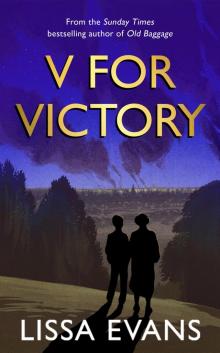 V for Victory
V for Victory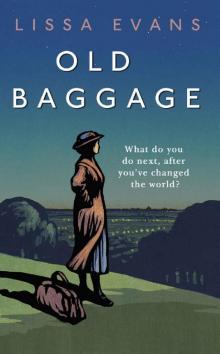 Old Baggage
Old Baggage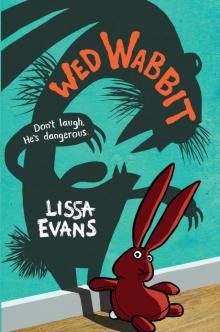 Wed Wabbit
Wed Wabbit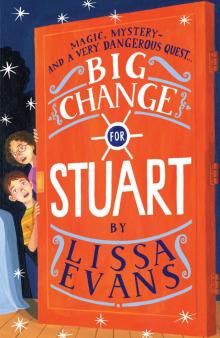 Big Change for Stuart
Big Change for Stuart Spencer's List
Spencer's List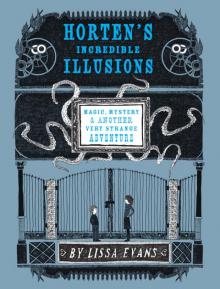 Horten's Incredible Illusions
Horten's Incredible Illusions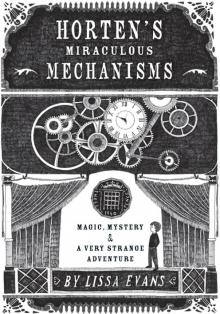 Horten's Miraculous Mechanisms
Horten's Miraculous Mechanisms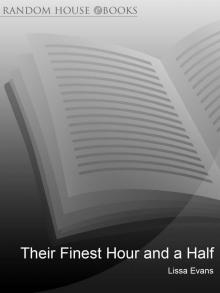 Their Finest Hour and a Half
Their Finest Hour and a Half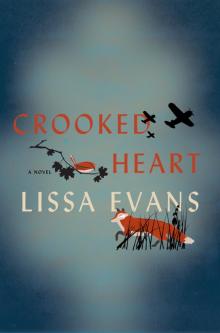 Crooked Heart
Crooked Heart